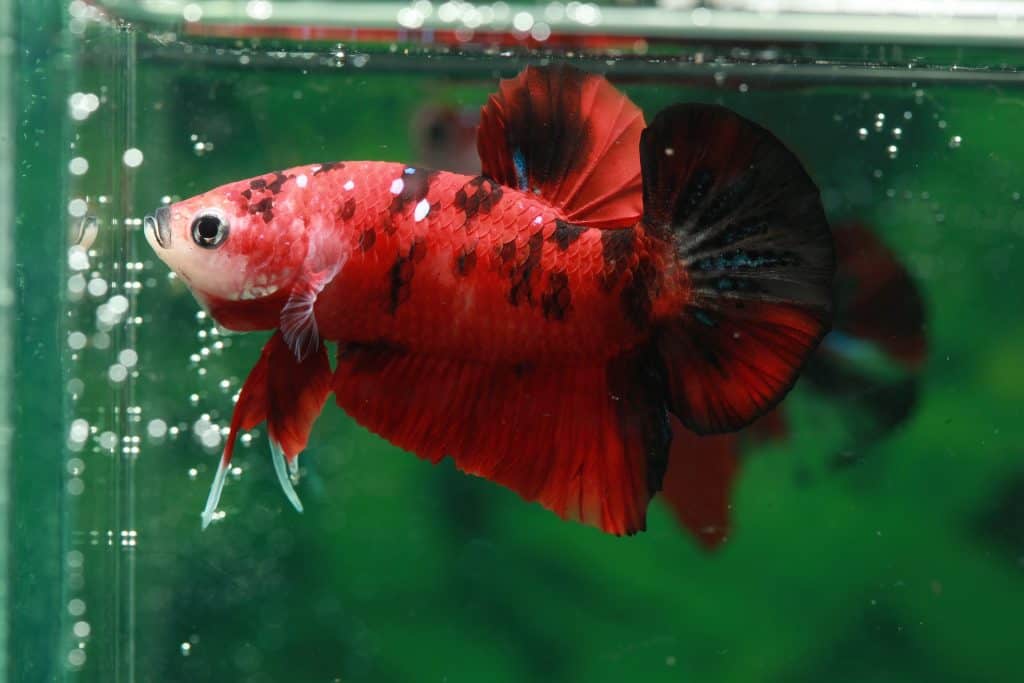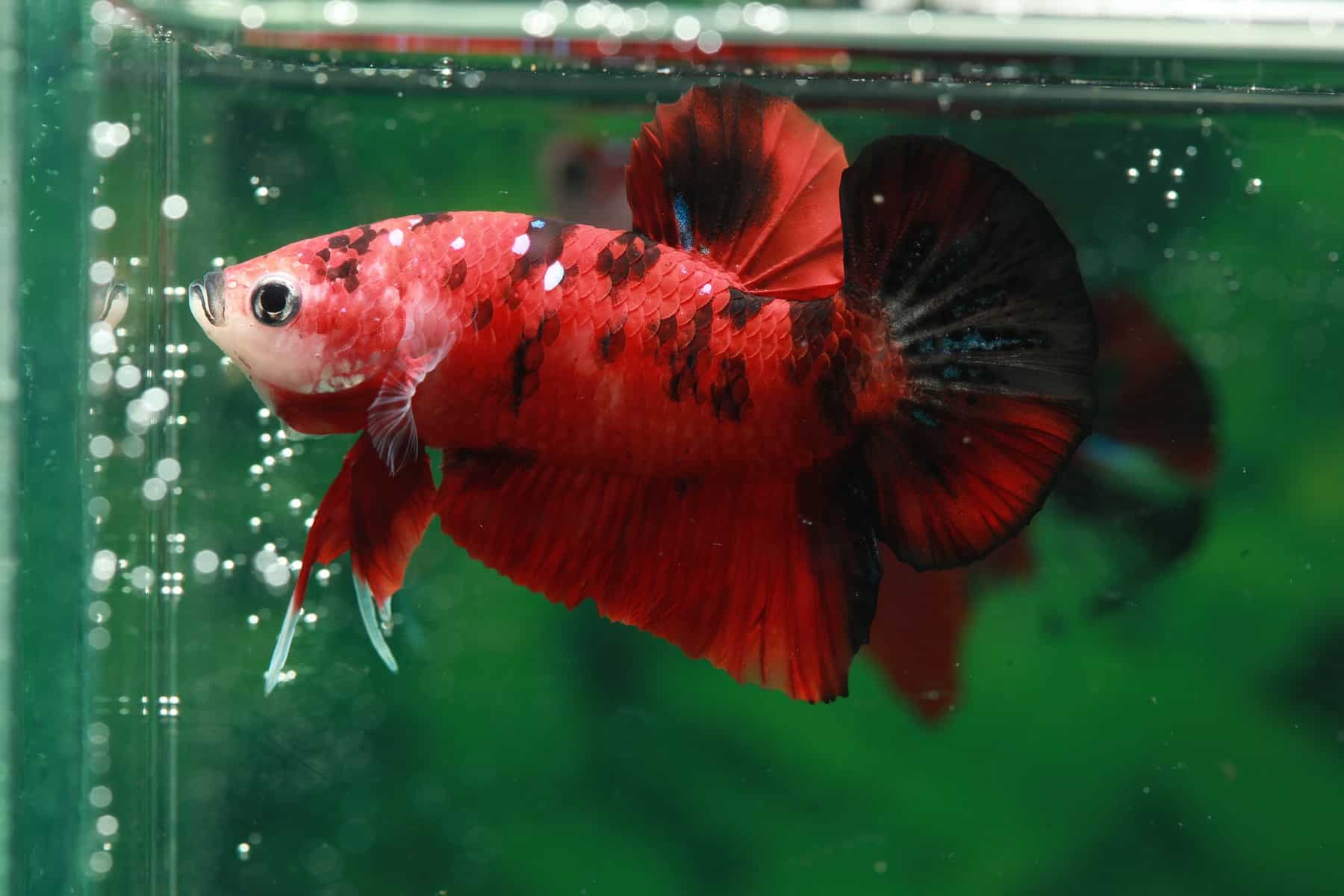It’s always a sad moment when your betta is sick with little chance of recovery. If your pet fish is suffering excessively and you feel it would be kinder to end its life humanely, you’ll probably be asking what is the kindest way to do so.
To make sure that I’m offering the most up-to-date information, I’ve consulted the Royal Society for the Protection of Animals (RSPCA) for their authority on the best way to euthanize an aquarium fish.
Key Takeaways
- It can be difficult to determine when a fish is still able to make a full recovery or needs its life to end immediately. If in doubt, consult a qualified vet or aquarium expert.
- If euthanasia is the only option, asking a vet or using clove oil are the kindest, most humane methods usually recommended.
- Other methods such as using alcohol, freezing temperatures, and suffocation can cause a slow and painful death, so must be avoided.
Factors To Consider Before You Decide to Euthanize Your Fish
When Is It Time to Euthanize Your Fish?
It can be a very sad event, but when a fish is severely sick, it’s sometimes kinder to end its life humanely than to continue letting it suffer.
Deciding exactly when is the moment to conduct this regrettable task can be very difficult. You may be holding out hope that your fish will still make a remarkable recovery; it can take experience and in-depth knowledge to make an accurate prognosis.
Much of the time, the ideal solution would be to consult a qualified exotics vet to discuss whether there remains any chance of a successful recovery. You can also use online aquarium fish forums to post videos and ask experts their opinions.
In other cases, however, when your fish’s health has been declining for a long time, or when they’re severely injured, it can become obvious when a full recovery is no longer possible.
How To Humanely Euthanize a Betta Fish
Ask a Vet
If you’ve asked an exotics vet to help you decide if your fish needs to be euthanized, they can also complete the euthanasia procedure for you.
Because vets have access to medical supplies that the public can’t obtain, they can use strong doses of powerful anesthetics such as MS-222 tricaine methanesulfonate and benzocaine hydrochloride to end your fish’s life with minimal suffering.
Use Clove Oil
If you decide to complete the euthanasia of your fish yourself, then using a clove oil mixture is a popular method. Clove essential oil is a natural sedative that is available over the counter at pharmacies and alternative medicine stores.
By causing the gills to stop moving, clove oil causes death by hypoxia in pet fish when administered in high enough doses. Some people even believe this to be a more humane method than pharmaceutical anesthetics.
Here’s how to use the clove oil method:
What You’ll Need:
- Clove essential oil
- A Large empty container that the fish can fit in. The fish should be able to move around without being cramped in the container.
- Small jar or glass tube for mixing clove oil
Process:
- Fill the empty container with water from your fish tank.
- Fill your smaller container half-full with the same water. Pour some 3-4 drops of clove oil in it. Shake thoroughly to mix, as clove oil doesn’t dissolve in water.
- Pour the mixture of clove oil and water into the large container, dispersing it evenly. Stir in more thoroughly if necessary.
- Place your fish into the mixture in the large container. Wait until it’s breathing slows and it becomes fairly immobile.
- Mix/emulsify and add additional clove oil until you’ve reached a concentration of 0.4ml:1 liter of aquarium water.
- Wait until you see absolutely no gill movement in your fish for the next hour to ensure the euthanasia is complete.
- Dispose of your dead fish by placing it in a ziplock bag into the garbage, or by burying it. Never flush a fish down the toilet or expose it to a water source.
Ways NOT to Euthanize Your Fish
Alcohol
Falsely imagined to be a humane method, you’ll often see alcohol euthanasia suggested on message boards and poorly researched web articles.
While some people think that vodka or other strong spirits will cause the fish to get drunk and pass away peacefully, alcohol will actually burn their gills, causing a rather painful and slow demise.
Freezing or Boiling
Freezing your fish to death isn’t particularly fast and it’s likely to cause considerable suffering before death.
According to the Royal Society for the Protection of Animals, placing your fish in boiling water is equally inhumane.
Flushing
Fish that aren’t already dead will experience a slow, unpleasant death as they are exposed to the chemicals and cold temperature of your toilet water.
Furthermore, dead fish should never be flushed down the toilet anyway! The bacteria, parasites, and viruses that a dead fish contains can easily contaminate local water sources and infect the aquatic animals and organisms living there.
Suffocation
Many people think the fastest way to kill a fish is simply to take it out of the water. This is extremely unpleasant for your fish as it causes your fish’s organs to fail before they die.
Additionally, because betta fish have a labyrinth that allows them to breathe some oxygen directly from the air, this process would be even slower and more painful for them.
Conclusion
If you’re sure that your betta fish is suffering without any hope of recovery, the kindest method of euthanasia is either by calling a qualified vet to administer an anesthetic overdose or by using clove oil.
Many of the other methods that are sometimes used cause considerable pain for your fish. Always put your pet’s welfare first by offering them the most painless, dignified end to their life possible.


Sadly I had to do the clove oil procedure for the first time today. Removed my gal and put in a separate small bowl. Took a little while for her to stop moving with the oil added, but was very evident when it worked. A couple wiggles and she was still. Adding the second round of clove/tank water mixture to her cup did the trick. After a few minutes she was off to the great fishy lake in the sky. I really had to watch to be sure she was gone. Thank you for the humane euthanasia advice. It was better than watching her suffer after failed med treatments.
so, our poor beautiful red Beta ate some brine shrimp that was recommended about 8 weeks ago and developed swim bladder??? it is terrible to watch him. he cannot swim, he struggles to get to places in the tank where he can be held steady and either upright of on his side. at times he will try to swim but he cannot. we tried remedies and nothing has worked and it is going on 3 months. he barely eats a pellet or 2 every day or two. is he in pain and should we end his suffering if he is in pain. we love him and feel so guilty for giving him that shrimp. please help us make this decision. Thanks from a distressed Beta Mom.